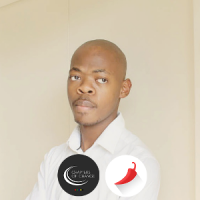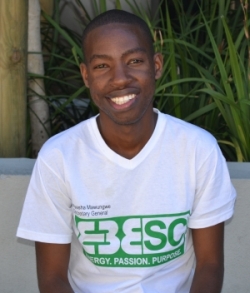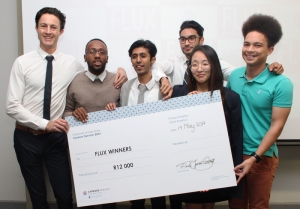EBE Entrepreneurs making a difference

EBE students are coming up with creative and innovative ideas to make a difference in people’s lives through social entrepreneurship.

Ntsako Mgiba, a final year mechatronics student is the CEO at Jonga, a tech start-up and social enterprise that provides a low-cost security system to lower-income families. Ntsako, together with Kabir Prema, a third-year electro-mechanical student, and Ntandoyenkosi Shezi, a final-year business science student, were part of the 2015 20 week Upstarts programme for aspiring social entrepreneurs at UCT. Mgiba said, “I have always been aware of my surroundings and pick on things that could be improved. This is why I decided to go into engineering. I want to equip myself with the necessary tools to identify and solve problems. I love being an entrepreneur and I plan on cultivating the entrepreneurial spirit in me.”

University text books are a great expense and many students find that they can no longer afford them. With this in mind, Wisani Shilumani, a final-year mechanical engineering student, founded Chapters of Change, an organisation that aims to provide free textbooks to students who cannot afford them. He is also the co-founder and director of Jalapeno Digital, a digital marketing agency that focuses on web and app development. His passion for technology was sparked at an early age playing computer emulated arcade games. He says it revealed worlds of immeasurable possibilities to him. “Our engineering minds are like unswung pendula. We have useful knowledge in our minds that can be used to better the lives of people.” He added that that running the organisation has made him realise the importance of working with people and asking for help. “If you want to go fast, go alone; if you want to go far, go together. The future of our continent lies in working together.” Shilumani has developed a website (www.chaptersofchange.co.za) where people can donate and he is working closely with the student councils on campus.

After not being able to find a healthy snack on campus, Nyasha Mawungwe, a third-year chemical engineering student, created his own healthy snack called Why Nut. He started in January 2017, and by May, four food outlets on campus are stocking his product. Mawungwe pulled in his fellow engineering student and close friend, Maxwell Kahuma to help him with the logo and packaging. He has developed a Facebook page and an Instagram account where he plans to post information to educate the UCT community on healthy living. His love for chemistry and maths led to him choosing to study chemical engineering. “I also want to be involved in the renewable energy sector, and looking at all the engineering degrees, I thought chemical engineering would equip me the most to advance the use of sustainable energy in southern Africa,” he explains.

Mihlali Dilima (final-year chemical engineering student), Thandeka Chehore (third-year civil engineering student) and Cassandra da Cruz (third-year civil engineering student) met each other at the 2016 UCT Upstart, the university’s annual social innovation challenge, which seeks to kickstart a new generation of entrepreneurs. Their idea started with da Cruz selling pregnancy tests on campus. She said there was still a stigma around young women buying pregnancy tests, which she wanted to avoid by providing a service where she personally delivered them. When she met Dilima and Chehore, they decided to expand the scope of da Cruz’s initial idea and include tampons and sanitary pads. By not marking up their goods, they are able to sell them at two-thirds of the price found at stores. They have bought and refurbished two old gumball machines which are now ATM—automatic tampon machines. They have been placed in the ladies’ toilets on upper campus.

A team of final-year electrical and mechanical engineering students took the title of 2017 Flux champions. Team StartSmart – comprising Dominic Schorr, Ntsako Mgiba, Nikhil Mohanlal, Do Yeou Ku, Jaydon Farao (all electrical engineering students) and Jasanth Moodley (a mechanical engineering student) – scooped the R12 000 prize.
Flux is an entrepreneurship business game where teams of students are given real-world problems that they need to address and for which they need to present a solution. The aim behind the entrepreneurship challenge is to introduce students to the key elements involved in creating and running a business. The competition is run annually by UCT Careers Service in collaboration with UCT Libraries. Approximately 120 students and 20 industry experts took part.
The day had students working in teams of six to prepare a profitable business idea, using technology, that would change the way education works in South Africa. StartSmart’s idea was a free mobile platform that helps students grow throughout their academic careers by providing relevant academic resources as well as daily quizzes and educational games. The platform will also develop non-academic skills by offering career guidance and resources during job and university applications.
“Our users are students but our customers are corporates who pay for access to students with high potential,” says Schorr. “We use the data gathered during students’ use of our platform to link them to bursars and employers that fit their skills and interests and ensure that the best students have access to opportunities that are right for them.”
“I encourage our alumni to support these young entrepreneurs. They represent the energy and innovation that we would like to foster and celebrate in our faculty,” said Professor Alison Lewis, dean of the Faculty of Engineering & the Built Environment.